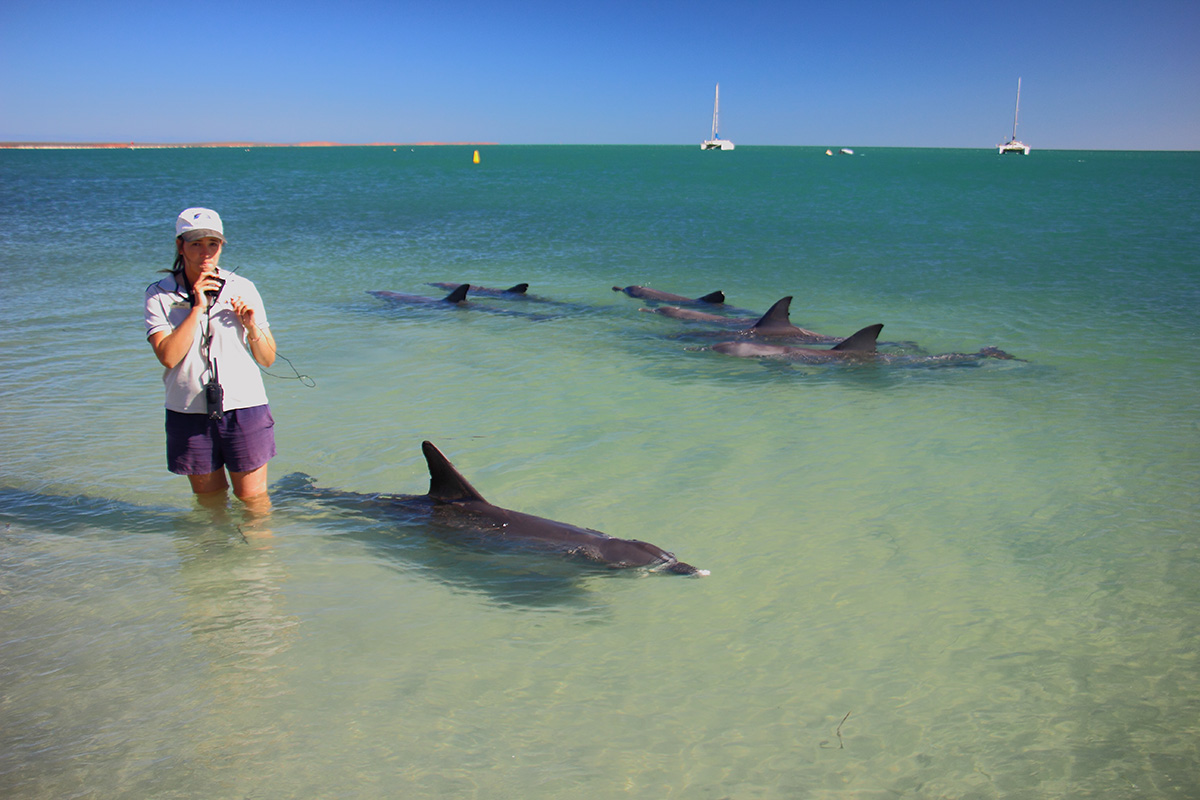A marine biologist interacts stands just offshore while interacting with wild dolphins in Monkey Mia, Australia.
What’s It Like to Be a Marine Biologist? How Do You Become One?
Shutterstock.com/rizd
Some of the most common marine biology questions I receive are about career advice from folks who want to be marine biologists themselves. I am generally hesitant to give any kind of specific career advice because I don’t know you—I don’t know your strengths, your goals, what’s a deal breaker for you and what you’re willing to compromise on, what’s stepping a little outside of your comfort zone and what would trigger a panic attack. Furthermore, what worked for me might not work for you, and what didn’t work for me might work great for you, because my path is certainly not the only path.
Since so many people want guidance about careers in marine biology, however, think there’s value in providing general answers—with the understanding that you probably shouldn’t make any major life decisions based on a single article that you read on the internet. With this in mind, here I’ve synthesized past advice I’ve given along with new information and links to further reading.
What is a marine biologist?
At the simplest level, a marine biologist is a scientist who studies living things in the ocean. The methods may vary—taxonomists, geneticists, ecologists, sensory biologists, and representatives from many more scientific disciplines can be applied to marine life—but the gist of it is using scientific methods and tools to study life in the ocean. (Notably, studying freshwater life is typically considered separate, usually “aquatic biology,” though for plenty of species and ecosystems the boundaries get fuzzy pretty quickly). I should point out here that while some marine biology research projects involve scuba diving, most do not. This can be heartbreaking for some but encouraging for the seasick-prone who love the ocean!
I typically introduce myself as a “marine conservation biologist,” and if you’re curious about the difference between marine biology and marine conservation biology I invite you to check out my explainer for the Ocean Conservancy.
What does a marine biologist do?
At a bird’s eye view level, my job is not that different from that of other scientists. I teach, mentor graduate students, write grants, collect data, analyze data and write it up in scientific papers, and attend and present at conferences. The difference is what I teach and what my data and projects are all about.
What does a marine biologist study?
Marine biologists study all kinds of things! If there’s a scientific mystery surrounding something that lives in the ocean, that’s a job for marine biologists. From the smallest phytoplankton to the largest animal on Earth (the blue whale), marine biologists study everything from their DNA and their cells to their large-scale migrations and ecological interactions, using a huge variety of different scientific tools. Notably, most marine biologists tend to specialize in a particular species (or group of species), research method, or ecosystem, though multi-disciplinary approaches and multi-scientist collaborations are becoming increasingly common.
How do you become a marine biologist? What degrees do you need to be a marine biologist?
What job you want affects what degrees you need. As I noted in a past career advice column:“If you want to be a practicing, research-performing marine biologist, you’re almost certainly going to need some graduate school. Almost any research job in marine biology requires at least a master’s degree, and many require a Ph.D. If you want to have any control over what type of research you do (rather than being a technician working on someone else’s project), you’re almost certainly going to need a Ph.D.”
Knowing what kind of work you want to do is important so you can make informed decisions about your educational patch—spending more time and money getting advanced degrees you do not need is, generally speaking, inadvisable.
Where does a marine biologist work?
It’s not always the ocean! I work for Arizona State University. We have a large and growing marine biology and conservation program despite not exactly being coastal. Kansas State University also has a great marine biology program. It’s not uncommon for scientists to spend a few weeks a year in the field gathering data and samples and then spend the rest of the year in the lab or office analyzing it—and the lab or office can be far, far away from the field site. I know plenty of marine biologists who never go near the ocean, they just analyze data and samples gathered by others.
But generally speaking, as I noted in a past career advice column : “Most marine biologists are employed by colleges or universities, or by government natural resource management agencies, though a growing number are employed by environmental nonprofits. A scientist who works for a nonprofit is not the same thing as an environmental advocate, by the way; they have very different roles and responsibilities. Scientists who work for environmental nonprofits typically work as technical advisors for advocate groups, and some are also able to perform independent research. The main difference between marine biologists who work for each type of employer is how much freedom they have to choose their research topic: Academics have the most freedom here, while government scientists work on federal research priorities, and environmental nonprofit scientists work on a conservation issue that their employer considers a priority.”
How much money does a marine biologist make?
It varies widely. Field assistants typically make minimum wage, the most senior scientists (who are often at the administrator level at that point in their career) make well into six figures. Glassdoor says that the average is $86,000 a year, which seems laughably high to me—that’s notably a higher salary than any of the entry-level professor jobs that I’ve applied for, which require PhDs and years of teaching and research experience. The recent job postings that Glassdoor shares salaries from (as of this writing) include a Texas field tech job for $11 an hour and a middle career level NOAA job for $91,800 a year. Generally, while experienced, senior, and highly credentialed marine biologists can do quite well financially, early career professionals tend to be extremely underpaid, which is especially problematic when you have to live in expensive cities for work. This is not a career one pursues for the fat paycheck.
How can I find marine biologist jobs?
It depends on the type of job you’re looking for, because some types of positions advertise in specific idiosyncratic ways (USAJOBS.gov, the application portal for Federal science jobs, is its own beast).
In general, though, there are a variety of ocean science and conservation job boards that advertise many positions. I’ve found that if you regularly check any two of them, you’ll rarely miss a job posting. The three I rely on most are Conservation-Careers.com, SevenSeas Media’s ocean jobs board, and Florida Sea Grant’s weekly jobs round-up.
I’ll share with you an exercise that I have my Georgetown students do in my Advanced Topics in Marine Conservation Policy course. Check out the SevenSeas Media board and scroll through the recently posted jobs. Pick a couple jobs that sound super exciting to you, and then a couple more at random. For each, figure out what your day-to-day responsibilities would be, where you’d have to live, what degrees or credentials are needed to get that job, and how much it pays. Note that this is useful for you to do now, before you start years of preparation and education, to give yourself a sense of what kinds of jobs exist and what skills to work towards—there’s nothing worse than finding your dream job and realizing you’d be a perfect fit if only you’d taken that one class three years ago. My students are often surprised at what’s out there, how much experience it requires, and how little it pays, but they usually find some dream jobs in the mix.
Is being a marine biologist as awesome as it is in my imagination?
There are hard days, but I gotta tell y’all, I love my job.
Ask a Marine Biologist is a monthly column where Dr. David Shiffman answers your questions about the underwater world. Topics are chosen from reader-submitted queries as well as data from common internet searches. If you have a question you’d like answered in a future Ask a Marine Biologist column, or if you have a question about the answer given in this column, email Shiffman at This email address is being protected from spambots. You need JavaScript enabled to view it. with subject line “Ask a marine biologist.”
David Shiffman
Courtesy Image
Dr. David Shiffman is a marine conservation biologist specializing in the ecology and conservation of sharks. An award-winning public science educator, David has spoken to thousands of people around the world about marine biology and conservation and has bylines with the Washington Post, Scientific American, New Scientist, Gizmodo and more. Follow him on @WhySharksMatter on Twitter, Facebook and Instagram, where he’s always happy to answer any questions about sharks.
The views expressed in this article are those of David Shiffman, and not necessarily the views Scuba Diving magazine.

When you subscribe to the blog, we will send you an e-mail when there are new updates on the site so you wouldn't miss them.
